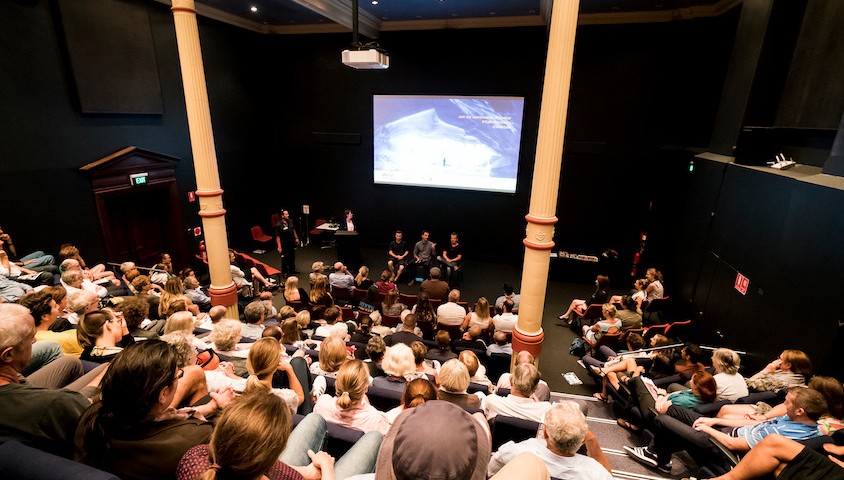Last Thursday night was the second installation of the Trailblazers Talk showcasing a private screening of the feature documentary film ‘The Crossing’, followed by a Q&A with film director Jules Harvey, and explorers Chris Bray and Clark Carter.
With an Audience Award for Best Documentary at the 2013 Sydney Film Festival, the film took the audience through the trials and triumphs experienced by both Bray and Carter, with actual footage documented throughout the expedition on the remote, and never-before crossed Victoria Island, Canada.
The film retells a story of two young and resourceful adventurers making it through all odds with the never-failing persistence to reach their goal. A film to inspire the younger generations, the documentary told their story of humble beginnings, plans of explorations, preparations, inventions, failures and achievements, in a humorous and moving documentary full of tenacity and youthful enthusiasm. “I just finished high school and I wanted to go on an adventure for no reason… just to be irresponsible.” Carter explains in the film. As complete strangers, Carter managed to find Bray through a Google search, after Bray had previously completed a 30-day expedition in Tasmania’s untracked south-western wilderness. Carter contacted him via email, and together they planned their expedition.
The explorers embarked upon the expedition to cross the eighth largest island, the remote Canadian Arctic Archipelago of Victoria Island via kayak and trek unassisted. Inventing a custom kayak-cart (PAC), to drag through the arctic and a polar bear alarm for their adventure, they soon found out that they completely underestimated the Victoria Island terrain. “Google Earth didn’t exists back then, so we were going off photos… it was harder than we thought it would be.” Bray explains. “We underestimated everything, from the cost, the walk, and the time it takes to build everything” Carter retells. Aiming for a 15-kilometre progression each day, they were only able to drag their PACs for a few kilometres per day. It was understood that they would not be able to reach their goal within the 65 day target. With sarcasm, enthusiasm and positive assurance through bogging issues, ice terrain, snow lakes, arctic wolves’ encounters, and the insanity of not seeing humans in months, Bray and Carter persevered through their expedition, refusing to give up.
After 300 kilometres and as winter was fast approaching, the expedition had to be cancelled for their safety. Upset and disappointed, Bray and Carter returned home, only to return three years later to continue their expedition. After the failed attempt, they reinvented their PAC (PAC II) to withstand the terrain they now knew, training for three years for their second and last attempt.
Arriving back to Victoria Island, they broke their remaining 700-kilometre trek up into sections as achievable goals. The muddy terrain bogged them down, the bad weather dampened their spirits, and the jagged ice and rocks were damaging the wheel covers that they were constantly repairing. They lightened their load at the 100-kilometre mark to continue their journey, reaching the river to paddle a portion of the way, then trekking through the remaining terrain to reach their goal.“The world became wonderfully simple and brutally honest.” Bray reflects on the issues of spending two months in the remote Arctic. “There is a certain time in every trip where you think ‘why am I during this’ and there better be more pro reasons than cons in your head” Carter explains during a tough time dragging their carts in the rain, “we will get there even if it means we will crawl on our hands and knees.” It became a personal fight with Victoria Island. Obstacles kept occurring and the remoteness pushed them to the edge “we are broken men, but we are trying to laugh.” Carter and Bray said with difficultly to the camera. “Once your body falls apart, your mind cannot keep up with everything.” Carter explains. They suffered exhaustion, disorientation, stress, and Carter suffered from a sprained foot.
After walking and paddling for 126 days they were close enough to see the coast, and the end of their expedition. “There was a disbelief of the final destination because it has only been up here (indicating his head)” Carter explains. On the 128th day after approximately 1000 kilometres and more set-backs, they pushed their PAC II to the end elated and triumph, with a light-hearted “Up yours Victoria Island!” to the camera.
“It’s about breaking life’s obstacles as they come,” Bray explains “break it into achievable goals, never give up, and you could cross an island that tries everything it can to stop you.”
The Trailblazers event will be open until 18 July 2016, with the Trailblazers Talks running till 14 July 2016.


